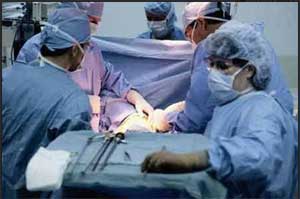- Home
- Editorial
- News
- Practice Guidelines
- Anesthesiology Guidelines
- Cancer Guidelines
- Cardiac Sciences Guidelines
- Critical Care Guidelines
- Dentistry Guidelines
- Dermatology Guidelines
- Diabetes and Endo Guidelines
- Diagnostics Guidelines
- ENT Guidelines
- Featured Practice Guidelines
- Gastroenterology Guidelines
- Geriatrics Guidelines
- Medicine Guidelines
- Nephrology Guidelines
- Neurosciences Guidelines
- Obs and Gynae Guidelines
- Ophthalmology Guidelines
- Orthopaedics Guidelines
- Paediatrics Guidelines
- Psychiatry Guidelines
- Pulmonology Guidelines
- Radiology Guidelines
- Surgery Guidelines
- Urology Guidelines
Plastic surgery day: Fortis doctors give Ghanaian new genitalia

New Delhi: Abdullahi Kojo (name changed) from Ghana has no complaints -- not after a group of doctors in India gave him a new set of genitals.
A year after he was attacked by a stray dog that bit off his testes and scrotum back home in Ghana, Kojo says life is back to normal.
The Ghanaian, on the advice of a doctor in his country, decided to seek help in India and, two operations later, says he is now experiencing a "good sexual life".
As India celebrates National Plastic and Reconstructive Surgery Day, doctors who conducted two operations on him at Fortis Hospital in Shalimar Bagh here talk about the challenges of such surgery, and how far the country has moved in this area of treatment.
Dr Richie Gupta, senior consultant, department of plastic, aesthetic and reconstructive surgery at the hospital, said reconstructing a body part, particularly genitals, needed the skills of both a surgeon and an artist.
According to her, penile reconstruction surgery is akin to "performing four or five reconstructive surgeries in one sitting", during which a new penis, urethra and scrotum are created.
"Penile reconstruction is one of the most challenging and difficult operations in plastic surgery," she said.
The surgery involves the "tedious art of sculpturing" and "meticulous microsurgical skills" to make the reconstructed part look like a normal penis.
"Hence, it involves the skills of an artist and plastic surgeon specialised in microsurgery," Dr Richie told .
With Sushruta -- believed to have been born in 600 BC and author of an ancient text on medicine and surgery -- hailed as the father of plastic surgery, it was perhaps natural for doctors in Kojo's hometown to suggest treatment in India.
"One of the doctors in my country told me about phalloplasty and said India had good doctors in this speciality. While searching the Internet, I came across the website of a doctor and contacted him," he told .
Doctors said plastic surgery in India is now performed using the latest procedures, with the help of 3D printing, fat and stem cell therapy and many other processes.
For Kojo's operation, the "Radial artery forearm flap, Tube within tube technique" was used, where the genital was recreated with the skin, blood vessels and nerves taken from his forearm.
"The total operation took almost 12 hours. Post surgery, pain lasted for two weeks," the patient said. The surgery cost him about Rs 3.5 lakh.
Six months later, silicone rods were inserted, and Kojo, who was a university student in Ghana when the dog attacked him, is now back home.
One of the major risks involved in such surgeries is scarring of the body part which is used for the flap -- the lifting of tissues -- on the injured site. Patients are given an option of penile reconstruction with a "thigh flap". Most patients go for that, since the grafting leads to multiple scars which are not as visible on the thigh as they are on forearm.
Flap loss and accidental urinary leaks are among the other risks involved, added Dr Rajat Gupta, associate consultant, plastic surgery, at the hospital.
The idea of reconstructing one's genitals may seem impossible, but Kojo urges people not to hesitate to seek help if they face similar problems.
"Loss of my genital was my biggest trauma. I had to see a psychiatrist in Ghana. I never knew that it could be regenerated and I could get back to my previous life. Science and technology have advanced, and we must use them for our benefit," Kojo said.

Disclaimer: This site is primarily intended for healthcare professionals. Any content/information on this website does not replace the advice of medical and/or health professionals and should not be construed as medical/diagnostic advice/endorsement or prescription. Use of this site is subject to our terms of use, privacy policy, advertisement policy. © 2020 Minerva Medical Treatment Pvt Ltd